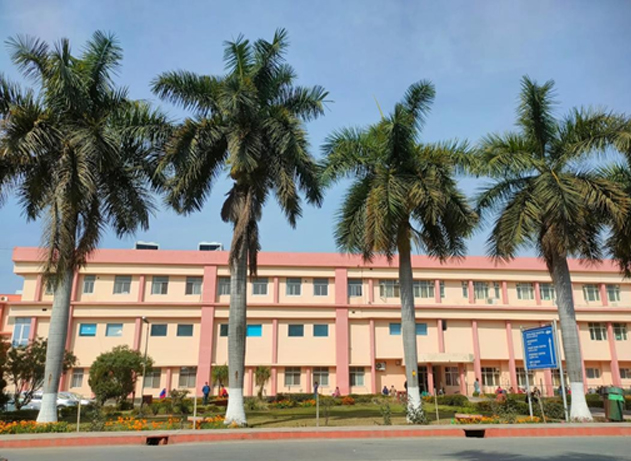Biodiversity
September 25, 2025 2025-09-25 9:20Biodiversity
Biodiversity
Swami Rama Himalayan University (SRHU) fosters campus biodiversity through initiatives like a Biodiversity Park, Botanical Garden, and extensive Green Belts and Urban Forests, creating habitats for wildlife and offering educational opportunities. The university’s commitment extends to research on conservation, as seen in its work on aquatic biodiversity and sustainable practices, and involves community engagement in environmental stewardship, aligning with Sustainability cell.
Biodiversity Park supporting wildlife and education on campus
Botanical Garden promoting conservation and research
Enhancing Environmental Awareness and Education
In alignment with global imperatives such as the University has undertaken a series of structured, interdisciplinary, and participatory initiatives to cultivate environmental literacy and promote ecologically responsible behavior across its academic and social ecosystem.
Activities includes are Academic Lectures and Expert Dialogues, Pedagogical Integration and Student Engagement, Community Outreach and Field-Based Environmental Literacy

1. Enhancing Campus Biodiversity
Reduction of Pollution and Degradation
Swami Rama Himalayan University (SRHU), in its commitment to environmental sustainability and responsible resource management, has implemented a robust Effluent Treatment Plant (ETP) to actively contribute towards soil conservation and ecological health. The treated water undergoes rigorous quality assessments before being repurposed for horticultural use across the University’s parks, gardens, and green zones.
To reinforce its sustainability efforts, SRHU has installed “Plastic-Free Campus” signage across the campus. These signs serve as reminders for students, staff, and visitors to avoid single-use plastics and support initiatives like the Plastic Waste Bank and plastic-to-diesel recycling project. The signage not only promotes awareness but also fosters a culture of environmental
2. Plantation Drives
Campus Biodiversity Park
SRHU has developed a comprehensive Biodiversity Park that serves as a living laboratory for students and researchers. The park showcases a variety of native plant species, promoting conservation while offering rich educational opportunities in ecology and environmental science.

Campus Biodiversity Park serving as a living laboratory for research and learning

Native plant species promoting conservation and ecological education
Enhancing Environmental Awareness and Education
Campus Biodiversity Park
Campus Biodiversity Park and Eco-Friendly Initiatives
Campus Biodiversity Park
SRHU has developed a comprehensive Biodiversity Park that serves as a living laboratory for students and researchers. This park showcases a variety of native plant species, promoting conservation and offering educational opportunities in ecology and environmental science.
Eco-Friendly Green Belt
The university has established green belts around its periphery, planting over 3,500 trees to enhance air quality, provide shade, and create a serene environment conducive to learning and reflection.
Botanical Garden
SRHU’s botanical garden features a diverse collection of plant species, including medicinal and ornamental plants. This garden serves as a resource for botany students and researchers, facilitating hands-on learning and conservation efforts.
Sustainable Urban Forest
The campus includes areas designated as urban forests, where native trees and vegetation are preserved and nurtured. These forests act as carbon sinks, support biodiversity, and offer natural spaces for recreation and study.
Herbal and Medicinal Plant Garden
SRHU maintains a specialized garden cultivating a variety of herbal and medicinal plants. This garden supports research in Ayurvedic medicine and pharmacognosy, providing real-world applications for students in pharmaceutical sciences.
Waterfront or Lake Reserve
Due to geographical constraints, SRHU does not have a natural waterfront or lake reserve on campus. However, the university has implemented extensive rainwater harvesting systems to conserve water, support local flora and fauna, and maintain ecological balance.
Green Walkways and Lawns
The campus features extensive green walkways and well-maintained lawns, encouraging walking and outdoor activities. These spaces enhance aesthetic appeal while promoting physical well-being among students and staff.
Rainwater Harvesting Garden
Gardens equipped with infiltration wells and filter beds collect and purify rainwater, replenish groundwater levels, and reduce dependency on external water sources. The university also monitors water usage and groundwater levels effectively.
Community Garden
SRHU encourages community participation in sustainable practices through community gardens. Students and faculty collaborate to grow vegetables and herbs, promoting organic farming and environmental responsibility.
Environmental Research Zones
Dedicated zones focus on waste management, renewable energy, and sustainable agriculture, providing practical learning experiences and contributing to the university’s sustainability goals.
Wastepaper Recycling Plant
SRHU operates a Wastepaper Recycling Plant managed by a local Women Self-Help Group (SHG). Wastepaper from offices is recycled into envelopes, reducing waste, supporting community empowerment, and promoting sustainability.
Compost Pit
Organic waste from hospital and hostel kitchens (~10 kg daily) is processed at an on-campus compost pit. The resulting manure enriches campus gardens, fostering sustainability and reducing environmental impact.
E-Waste Management & Sewerage Treatment Plant
SRHU manages electronic waste responsibly and treats campus wastewater through a Sewerage Treatment Plant, supporting environmental sustainability and resource reuse.
Overall, SRHU’s commitment to integrating green spaces and sustainable practices into campus infrastructure enhances its ecological footprint while providing invaluable learning opportunities for students and researchers.

Campus Biodiversity Park serving as a living laboratory

Eco-friendly green belts enhancing campus environment

Botanical garden for research and conservation

Sustainable urban forest supporting biodiversity

Community garden promoting organic farming and sustainability

Compost pit converting organic waste into nutrient-rich manure
SWAMI RAMA HIMALAYAN UNIVERSITY
Swami Ram Nagar, Jolly Grant
Dehradun - 248016, Uttarakhand, India
Contact
Fax
Admission Open For 2025
×- About Us
- Academics
- Himalayan Institute of Medical Sciences
- Himalayan College of Nursing
- School of Science & Technology
- School of Management Studies
- School of BioSciences
- School of Yoga Sciences
- School Of Pharmaceutical Sciences
- Centre for Skill Development and Education, Toli
- Centre for Library and Information Management
- Admission
- Research
- Placements
- Alumni
- Campus Life
- What Next @ SRHU

